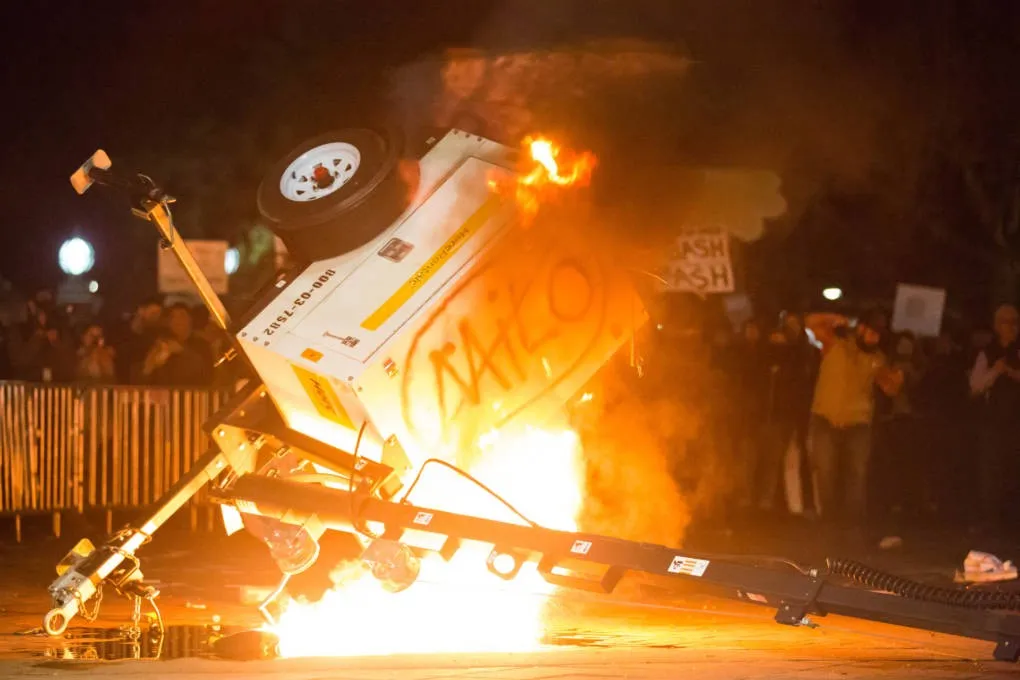Table of Contents
Last week the Daily Californian absurdly claimed that the violent protests by students and outside activists against Milo Yiannopoulos’s speech were an exercise of “free speech.” Far from it. If students truly think that violent protests are “a grand display of the same freedom of speech Yiannopoulos uses,” they are deluding themselves. Any ten-year-old reading the First Amendment for the first time knows that there is a difference between violently inflicting $100,000 in damages and peacefully giving a talk at a university-sponsored event.
Most of the violent agitators were not Berkeley students. But nonetheless, Berkeley’s reaction to Milo’s prospective talk was troubling. After his invitation by the College Republicans, a dozen faculty members wrote an open letter to the administration asking for the event to be canceled on grounds that his “harassment, slander, defamation and hate speech” violated Berkeley’s code of conduct. Separately, hundreds of students and faculty wrote to the administration.
Even more, there’s a distinction between deciding whether to invite a controversial speaker, or silencing him once he has already been invited. Certainly the second type of speech is protected. But Milo had already been invited by a student group and funded by the university. While peacefully protesting an event is certainly justified, attempting to prevent it from even being held is deeply troubling.
Perhaps incidents of extreme hatred that target individual students justify censorship. When Milo’s history includes projecting an image of and mocking a transgender student at the University of Wisconsin, threat of personal harassment was the most convincing argument for cancellation. At Berkeley, rumors (which he vehemently denied) floated that he would release the names of undocumented students. Such actions could ruin lives.
Even so, isolated incidents of harassment are too rare to justify the precedent of silencing a speaker. If anything, liberal campuses like Berkeley and Stanford err on the side of far too little intellectual diversity. Cancelling a speech on the vague justification of “hate speech” will set a far more dangerous precedent than allowing a bigoted speaker like Milo to spew his unreasonable hate. The more troubling trend is not hateful speakers on college campuses, but disrespect for the very institution of free speech.
Of course it is not as if the average Berkeley student attending the talk was likely to become a devoted member of the alt-right. And of course, student groups should deliberate carefully over whether to invite certain speakers in the first place. We believe strongly that student groups should contribute to a spirit of complex, nuanced, and reasonable dialogue. For that reason, the Review decided not to invite Milo last year when a student asked us to sponsor.
But when this right for students to engage in dialogue is questioned, ideas rise or fall not on merit, but on who writes censorship laws or has enough Molotov cocktails. Why should a certain group of people determine what is worth hearing? Liberal students rightfully criticize Donald Trump for declaring that flag burning should be illegal despite constitutional protections of political dissent. But hypocritically, those students don’t seem to care about the principle of free speech on their own campuses when it protects speakers they disagree with — hence countless cancellations of controversial speakers at university campuses.
Let’s look past our 21st-century blinders and heed veterans of Berkeley’s 1960s free speech movement, which culminated in a 1964 university resolution stating that “the content of speech or advocacy should not be restricted by the university.” In an editorial about Milo, these former activists argued that the substance of their movement mattered far more than one speech from a bigot.
If students and faculty of elite colleges are so enlightened, then surely they could have opposed Milo through means more aligned with the spirit of free speech, democracy, and reason: publishing editorials, discussing his ideas, asking pointed questions at the talk. In the marketplace of ideas, logical holes, bias, and ignorance become clear when opposing sides engage each other in debate.
Disappointingly, but predictably, Berkeley’s activism was self-defeating. It benefitted Milo. Frankly, the job of making Milo look stupid would probably have been easy for any reasonably smart student. But by opposing his right to even speak, students and faculty made Milo a martyr for the element of his brand that is holds more sway (and more merit) among his fans than his actual opinions — being an iconoclastic advocate for free speech and against political correctness. If Milo were not so vigorously opposed by liberals, he would not possess such legitimacy among the alt-right.
The Berkeley administration made the right choice in not preemptively cancelling Milo. Stanford’s administration should likewise not cancel invited speakers. But this incident could have a chilling effect on Stanford student groups. We’ve seen that despite their lip-service to free speech, liberal students might in fact prefer to silence speakers before they can open their mouths — rather than engage in the harder, more honest, and more intellectual work of refuting him as an educated citizen.
In an age of threat to our constitutional rights, we students have the ability, and the responsibility, to stand uncompromisingly for the First Amendment. We must combat wrong ideas not with protests, violence, and calls for censorship, but with reason and charity. At this, we can beat Cal.





